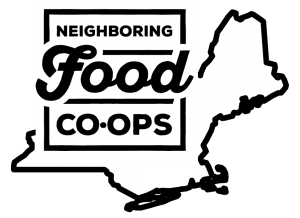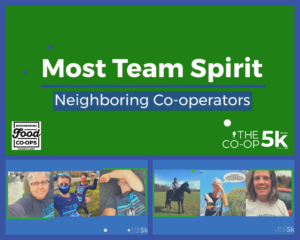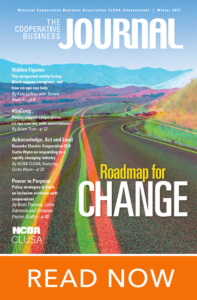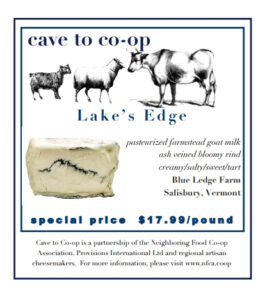 Your Neighboring Food Co-ops
Your Neighboring Food Co-ops
Locally Owned by More Than
160,000 People Like You!
In this Month’s E-News, check out:
- Celebrating a Decade of Co-operation
- Most Team Spirit at Co-op 5k
- NCBA CLUSA Annual Meeting
- #GoCoop! How Associations Grow Co-ops
- Farm to Freezer: Smoothie Time?!
- May’s Cave to Co-op Special
- Farmers Union: Take Action!
- Co-op Calendar
Celebrating a Decade of Co-operation
At the Neighboring Food Co-op Association’s 10th Annual Meeting, a panel of leaders from your Neighboring Food Co-ops and special guest Cornelius Blanding, executive director of the Federation of Southern Cooperatives, reflected on our past decade and potential moving forward.
Organized around the theme of Celebrating a Decade Growing a More Just,  Sustainable & Inclusive Food System, the event brought together 80 representatives from more than 47 food co-ops, startup initiatives, and partner organizations.
Sustainable & Inclusive Food System, the event brought together 80 representatives from more than 47 food co-ops, startup initiatives, and partner organizations.
Special guest Cornelius Blanding, Executive Director of the Federation of Southern Cooperatives / Land Assistance Fund, joined a panel of leaders from food co-ops across our region to reflect on the past decade and visions for the future, including Kari Bradley (General Manager at Hunger Mountain Co-op, VT), Annie Gaillard (President, Buffalo Mountain Co-op, VT), Ed King (General Manager, Littleton Food Co-op, NH), and Joanne Todd (Director, Willimantic Food Co-op and CEO, Northeast Family Credit Union, CT).
The Federation, which includes 75 co-ops in the Southeast U.S., grew out of the Civil Rights movement in the 1960s and focuses on co-operative development, advocacy and land retention for Black farmers. “There are always connections between co-operative associations,” said Cornelius. “For us, this has been about that Sixth Principle of cooperation among co-operatives, and not only looking at how co-ops within the Federation collaborate, but how we can collaborate with other associations, and particularly, the NFCA.”
A video recording is posted on our YouTube Channel.
The NFCA’s 10th Annual Meeting was supported by generous sponsors including CoBank, Cabot Creamery Co-op, Local Food Safety Collaborative, Nationwide, National Cooperative Bank (NCB), and New England Farmers Union.
We’ve got Co-op spirit, yes we do. We’ve got Co-op spirit, how about you?
This year for the Co-op Virtual 5k, Neighboring Food Co-op Association’s team, the “Neighboring Co-operators” won the “Most Team Spirit” Award!
From April 25 to May 1, 2021, co-operators from across the US walked, jogged and ran to raise money to support co-operative development in 2021CDF Virtual Co-op 5k. Our “Neighboring Co-operators” team featured rockstar food co-op board members and staff and co-op partners from across the Northeast, coming together with nearly 500 participants and 26 teams to support Cooperative Development Foundation in raising over $56,000 to support our co-operative movement!
The Cooperative Development Foundation (CDF) promotes self-help and mutual aid in community, economic, and social development through cooperative enterprise. Through its funds, fiscal sponsorships, and fundraising, CDF makes grants and loans that foster cooperative development domestically and abroad. CDF provides recovery grants to cooperatives impacted by disaster, scholarships to train local cooperative leaders, and funding for research and education to advance the understanding of cooperatives. CDF hosts the annual Cooperative Hall of Fame, an event that exists to recognize the accomplishments of outstanding cooperative leaders.
CDF has also been a partner in the co-operative development efforts of the NFCA, supporting our member gatherings, technical support for startups, and executive training events, and hosting fundraising efforts for our annual Neighboring Co-operator Award.
“There has never been a more important time for our community to come together to understand, engage and act on our shared Co-operative Identity — the values, principles and way of doing business that set co-operative enterprise apart.”
Erbin Crowell, Chair of the Board of Directors of National Cooperative Business Association (NCBA CLUSA) and Executive Director of the Neighboring Food Co-op Association, opened NCBA CLUSA’s 105th Annual Meeting, held virtually on May 3 (A recording of the event is posted HERE.). The gathering drew record attendance and provided an opportunity to lift up the the efforts of co-ops to serve their communities at this important time. Whether working to dismantle racism, build resilience in the face of climate change, or preserve small businesses during a pandemic, 2020 was a reminder that co-operatives have the greatest impact when they work together to live up to their shared values and principles.
recording of the event is posted HERE.). The gathering drew record attendance and provided an opportunity to lift up the the efforts of co-ops to serve their communities at this important time. Whether working to dismantle racism, build resilience in the face of climate change, or preserve small businesses during a pandemic, 2020 was a reminder that co-operatives have the greatest impact when they work together to live up to their shared values and principles.
“As you know, the Co-operative Identity is a living thing,” said Crowell. “The result of a continuing dialog among co-ops and co-operators around the world as we work to ensure that our movement is responsive to the economic and social challenges of our day, as well as our opportunities to grow, innovate, and empower more people in their daily lives.”
The Co-operative Identity, last updated by the International Co-operative Alliance (ICA) in 1995, will be the focus of the World Cooperative Congress in December, and NCBA CLUSA’s Cooperative IMPACT Conference in October. “These gatherings will be opportunities to understand how co-ops have responded to the pandemic and calls for racial and economic justice, how we can take on global challenges like climate change, sustainable development, peace and equality, and how we can work together to create a better, more fair and inclusive world for the future,” said Crowell.
During his message, NCBA CLUSA President and CEO Doug O’Brien called attention to the ways co-ops navigated the historic challenges of 2020. Beginning in March, NCBA CLUSA led efforts to ensure that co-ops across all sectors were eligible for critical federal relief programs. At least 3,000 co-ops accessed loans from the Paycheck Protection Program (PPP) and/or Economic Injury Disaster Loan (EIDL) program, which provided direct financial assistance of at least $1.2 billion. This relief helped co-ops maintain operations and support more than 1.2 million workers on their payroll and in their communities. Going forward, NCBA CLUSA will continue to keep co-ops on the radar of policymakers looking for strategies to rebuild a more equitable, resilient economy, O’Brien said.
A central message of the Annual Meeting was a call to NCBA CLUSA members to increase our impact by helping to grow their association: “You make all of the work we’ve shared today possible. Really, it is our collective work,” said Crowell. “And if we are going to expand this work at this critical moment, if we are going to take advantage of this opportunity to be part of rebuilding our communities in a way that is more resilient, sustainable, and inclusive, I also want to challenge you to be an active part of growing our association.”
For more information on how you can join NCBA CLUSA as a co-op, co-operative association, or as an individual, please visit their website. Note that NFCA Member Food Co-ops receive a 10% discount on member dues as part of our commitment to growing the co-operative movement.
#GoCoop! How Associations Grow Co-ops
A recent article in the Cooperative Business Journal highlights to role of co-operative associations such as the Neighboring Food Co-op Association in the growing co-ops and building more resilient and inclusive communities.
building more resilient and inclusive communities.
In the Winter 2020 edition of NCBA CLUSA‘s Cooperative Business Journal, Adam Trott, Director of Member Relations for Shared Capital Cooperative, a national CDFI loan fund for co-ops, and Executive Director of the Valley Alliance of Worker Co-operatives, explores the crucial role of co-op associations and federations in supporting the growth of co-ops.
“Individual co-ops are critical to the survival and health of their members; however, one co-op alone cannot address these larger, systemic issues,” writes Trott. “In the U.S., the pandemic’s casualties are reaching half a million, and a (long overdue) reckoning with racism is being met with more violence and repression. Associations are showing that the values of equity, solidarity and democracy are real and are at the core of the cooperative business model. Associations are showing, too, that when cooperatives themselves work intentionally together, access and education improve, development and legislation strengthen, and partnerships and innovations flourish.”
Read the full article ONLINE.
Farm to Freezer: Smoothie Time?!
Is it smoothie time yet? Of course it is! 
NFCA regionally sourced frozen blueberries are great for combining with other ingredients to make delicious healthy smoothies any time.
Blueberries are rich in vitamins K, C and B6, and manganese, and fiber. Blueberries contain antioxidants and one of the highest concentrations of anthocyanins which can reduce oxidative stress, thus lowering the risk of heart disease.1 A great way to boost your immune system is to incorporate more berries into your diet.
So eating blueberries is good for you and are a tasty, versatile ingredient to incorporate into a healthy diet. Your local food co-op works hard to support our local farmers and wants you to eat healthy too. By working together, food co-ops across our region are making regionally grown produce available to shoppers year ‘round, supporting family farms and helping you eat healthy too!
Try this using co-operatively sourced ingredients available at your local co-op.
- 1 bag NFCA Frozen Blueberries (10 oz)
- 2/3 cup Cabot or Organic Valley Yogurt
- ½ cup Frontier Natural Products Co-op Hibiscus Tea (brewed and cooled)
- 1/4 tsp Frontier Natural Products Co-op Vanilla
- dash Frontier Natural Products Ground Cinnamon
Combine all ingredients in blender. Blend until smooth. Serve immediately.
The vision of the Neighboring Food Co-op Association (NFCA) is of a thriving co-operative economy, rooted in a healthy, just and sustainable food system and a vibrant community of co-operative enterprise. When you choose products from co-operative enterprises, you are helping people to help themselves, build stronger, more resilient communities, and strengthen local economies.
Eat healthy and contribute to community building! Look for our Northeast Grown Frozen Fruits and Vegetables in the freezer section. They’re easy to find because they’re packed in a clear package so you can see what’s inside!
For more Farm to Freezer information and recipes–including warm weather recipes great for summer meals using frozen corn, green peas, or blueberries–visit: www.nfca.coop/farmtofreezer.
Lake’s Edge, Blue Ledge Farm, Salisbury, VT
Lake’s Edge is a pasteurized, farmstead goat-milk cheese with a bloomy rind. 
Cheesemakers Hannah Sessions and Greg Bernhardt believe in a food system that is based on a cornerstone of respect for the land, the animals, and the consumer as well as the local community. They both celebrate the opportunity to raise healthy, contented animals and make great cheese!
Hannah and Greg milk over one hundred goats and produce eleven types of cheese, from very fresh to semi-aged bloomy rind cheeses, to harder cheeses aged three months. True to their mission with a focus that is always on sustaining a high-quality, consistent product with lots of attention and gentle handling. The 150 acres of Blue Ledge Farm consist of woods, hay land, pasture and wetland which they have in the Vermont Land Trust, thereby ensuring that the land will always be open and never developed.
Lake’s Edge is Blue Ledge Farm’s signature cheese: a dramatic ash-veined goat cheese which is aged for three weeks and named after the stones found along Lake Champlain. Lake’s Edge is a beautiful cheese with a centerline of ash that contrasts with the chalk white of the paste. The texture is rich and creamy, denser towards the center and the flavor is the perfect balance of sweet, salty and tart.
We are fortunate to live in a region home to artisan cheese makers and farmers like Hannah and Greg that take part in the Cave to Co-op program. For over 10 years the partnership between Provisions International and the Neighboring Food Co-op Association has enabled us to been able to offer a delicious regional cheese each month at a great price. Supporting artisanal cheesemakers is key to strengthening our local and regional food system, a primary goal of the Cave to Co-op program and NFCA’s mission.
Read more about the Cave to Co-op program and this month’s recipes on the May Cave to Co-op page.
TAKE ACTION: Encourage your Congressional Representative to co-sponsor the Agriculture Resilience Act, supporting family farmers as they combat climate change!
The Neighboring Food Co-op Association (NFCA) is proud to join the New England Farmers Union and other organizations in endorsing the Agriculture Resilience Act (ARA), and is inviting food co-ops and their members to encourage their Representatives to become cosponsors.
Farmers Union and other organizations in endorsing the Agriculture Resilience Act (ARA), and is inviting food co-ops and their members to encourage their Representatives to become cosponsors.
Introduced by Congresswoman Chellie Pingree (D-Maine), who was also a special guest at the Neighboring Food Co-op Association’s 10th Annual Meeting in March, the legislation has already been cosponsored by a number of Congressional Representatives from the Northeast, including Jahana Hayes (CT), Annie Kuster (NH), Jim McGovern (MA), and Peter Welch (VT).
This bold, comprehensive legislation sets a roadmap to achieve net-zero emissions from agriculture by 2040 and empowers farmers with the tools and resources needed to improve soil health, sequester carbon, reduce emissions, enhance their resilience, and tap into new market opportunities. Pingree first introduced the legislation in the 116th Congress, where the ARA served as the House Select Committee on the Climate Crisis’ model for recognizing agriculture as a part of the climate solution.
“Extreme weather events are upending farmers’ bottom lines, threatening their businesses and risking the future of our food supply. Congress must work to keep farmers on their land, and we must work to empower those farmers to implement climate-smart practices that reduce the nation’s greenhouse gas emissions and increase their resilience in the face of climate change,” said Congresswoman Pingree. “The Agriculture Resilience Act focuses on solutions that are farmer-driven in order to reach net-zero emissions in this sector by 2040. Climate change deserves a whole-of-government approach, and I’m looking forward to working with the Biden administration to ensure farmers have a seat at the table as we work to address the climate crisis.”
In 2019, agricultural activities contributed 9.6% of total U.S. greenhouse gas emissions. To reach net-zero agricultural emissions by 2040, the ARA offers farmer-driven solutions rooted in science which build upon a suite of existing USDA research and conservation programs.
“Farmers are on the front lines of climate change and the Agricultural Resiliency Act provides us with more of the proven working lands programs as well as a range of new tools to bolster on-farm adaptation and mitigation strategies,” said Roger Noonan, President of the New England Farmers Union. “The focus on research and education is the key to meet the evolving needs of dealing with climate change.”
The reintroduced ARA includes an expanded grant program to fund the development and implementation for state and tribal soil health plans; bolsters the Conservation Stewardship Program, encourages the transition from annual to perennial crop production; increases support for the Organic Cost Share program; creates a new Processing Resilience Grant Program for small meat and poultry processors; and places a priority on underserved producers to advance equity.
Pingree, who was a special guest at the Neighboring Food Co-op Association’s 10th Annual Meeting in March, is a member of the Congressional Cooperative Business Caucus, which helps advance co-operative advocacy work at the federal level, providing greater visibility of the economic impact of co-ops before Congress and the Administration, and driving a co-op-friendly legislative agenda. She has been an organic farmer since the 1970’s and is a recognized national policy leader on sustainable food and farming. She is a member of the House Agriculture Committee and the House Appropriations Subcommittee on Agriculture. In January 2021, Pingree was named Chair of the House Appropriations Subcommittee on Interior, Environment, and Related Agencies.
Supportive statements from more than 60 organizations, including the New England Farmers Union, American farmland Trust, National Farmers Union, National Sustainable Agriculture Coalition, and National Organic Coalition can be found here.
You can view Congresswoman Pingree’s remarks at the Neighboring Food Co-op Association’s 10th Annual Meeting at this link.
Our Local Farmers & Fishermen Need You!
Do you care about where your food comes from and want to support the people who produce it? Join the NEFU as a Friend of the Farmer for just $15. Your membership will help ensure that our region’s producers and consumers are heard by policy makers here at home and in Washington, DC. For more information, please visit www.newenglandfarmersunion.org.
Join your Neighboring Co-operators for “Reckoning & Renewal” at CCMA, the national annual conference for Food Co-op directors, management, staff, & sector allies!
For More Co-op Events, Visit https://nfca.coop/calendar
The Neighboring Food Co-op Association (NFCA) is a co-operative federation of over 40 food co-ops and startup initiatives across New England, working together toward a shared vision of a thriving co-operative economy, rooted in a healthy, just, and sustainable food system and a vibrant community of co-operative enterprise.


